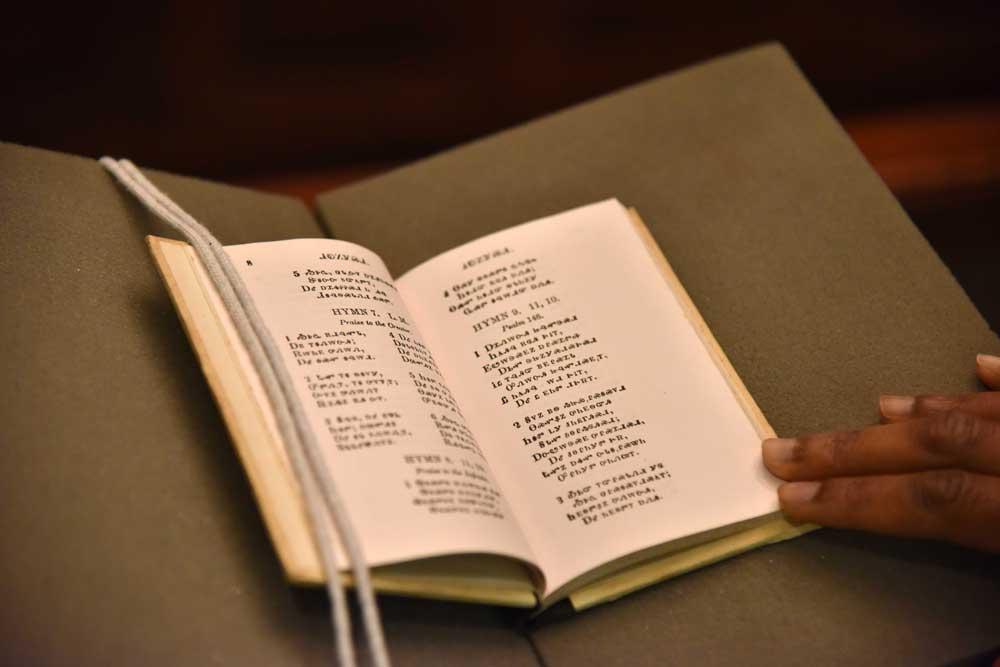|
Collection Development Policy
The Bentley Rare Book Museum is an important resource for teaching and researching
the history of the book, with a focus on the English-speaking world. Our collection
development policy allows us to build on our strengths and to add new voices to those
already present on our shelves.
-
|
The BRBM seeks to acquire materials that complement and enhance strengths already present within the collection. The BRBM also actively seeks new collecting areas that support the research and teaching of faculty members at KSU or that respond to current world events.
-
Medieval and Renaissance Manuscripts
A collection of roughly fifty manuscript leaves comprised largely of chant manuscripts and leaves from Books of Hours. Most pieces date between the thirteenth century and the sixteenth century. |
-
|
Texts illustrating Biblical history from the early modern period onward. Examples
include leaves from early translations of the Bible into English and the 1611 King
James Bible, French prayer books, and an authentic Lunar Bible.
|
-
|
Illustrated books, prints, and graphic novels demonstrating various artistic techniques, including woodcut illustrations, lithography, and metal engravings.
|
-
|
Significant works documenting the history and discovery of scientific thought. Notable pieces include the works of Galileo, Newton, Vesalius (facsimile), and the Royal Society of London.
|
-
Harlem Renaissance Literature
|
Novels, short stories, music, and poetry of major Harlem Renaissance writers, including Langston Hughes, Zora Neale Hurston, James Weldon Johnson, Nella Larsen, Arna Bontemps, Claude McKay, and Countee Cullen.
|
-
Sports, Recreation, and Travel Literature
Books and bound periodicals chronicling sports, leisure, and travels mostly throughout Europe. Of interest are editions of The Edinburgh Review between 1803-1819 and the sports and pop culture writings of Pierce Egan in early nineteenth-century England. |
-
|
A collection of over 700 individual newspaper issues from the late seventeenth century to the late twentieth century. This collection does not include full runs of newspaper titles.
|
|
-
Incunabula and Early Printed Books
Leaves and codices printed between the late fifteenth century and the end of the sixteenth century. Of interest are rare, sixteenth-century editions of Geoffrey Chaucer’s works. |
-
Materials written by and about the life of William Shakespeare. Highlights include a 1902 facsimile of the First Folio, excerpts of the Second Folio, a full Fourth Folio, illustrated versions of Shakespeare’s plays, and early modern works written by Shakespeare’s contemporaries. |
-
|
A combination of rare, unique, and historic books on the history of food and the restaurant business. The collection also contains a wide range of menus and cookbooks.
|
-
Nineteenth-Century British and American Literature
|
First and early editions of British and American literature in the nineteenth century. Example authors include Charles Dickens, Mark Twain, Jane Austen, Lord Byron, and Louisa May Alcott.
|
-
|
Books, primers, and periodicals from the nineteenth and twentieth centuries illustrating the development of children’s literature in the English language.
|
-
Books and manuscripts demonstrating the fine art of bookmaking. Example materials
include texts printed on handmade paper, books bound in calf-skin and morocco leather,
books containing gilded edges, marbling, embossing, and other artistic qualities. |
|
|
-
The BRBM collects a wide range of written and printed materials that emphasize the
importance of books as historical artifacts. First and foremost, the BRBM collects
works that are in good condition and useful for teaching and outreach. More specifically,
the BRBM seeks works that are considered first editions, association and presentation
copies, and/or essential writings by canonized writers of the English language. These
works also should exhibit physical or historical characteristics. In addition, the
BRBM collects reference books that support research of book history. |
-
The BRBM defines curation as the careful, intentional selection of rare books and manuscripts from a variety of sources, including rare book dealers, auctions, and gifts in kind. The BRBM bases its curatorial method on the organic connections that exists between and among texts, their creators, and the circumstances surrounding their creation. These connections manifest themselves in a variety of ways, including but not limited to geography, time period, authorship, evidence of provenance and use, publication history, format, materiality, artistic quality, and subject matter. The BRBM uses these connections, combined with informed assessments of rarity, condition, and usefulness in teaching, to develop its collection of rare books and manuscripts. |
-
Overall Criteria for New Acquisitions
|
Must enrich collection strengths through textual, paratextual, or historical elements
AND/OR must fill in gaps within the current collection:
- Must be in good to excellent condition
- Must be useful for teaching and instruction
|
-
|
Materials that no longer fall within the collection scope of the BRBM are subject to deaccessioning according to the MARB Collection Management Handbook. The BRBM curator and MARB executive director will work with appropriate entities at Kennesaw State University and the wider community to ensure the proper dispositioning of deaccessioned materials.
|
|





















